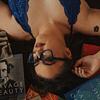You need to sign in or sign up before continuing.
Take a photo of a barcode or cover
Y’all. I have so. many. feelings. about this book. This one is going to stay with me for a long while.
Meet Rory Dawn Hendrix, the wise-beyond-her-years girlchild who’s the undisputed star of this story. RD is smart and brave, lonely and damaged, brash and sassy, vulnerable and terrified, cautiously hopeful, and possessing the sad wisdom of someone who’s seen way more than she should have. She’s everything I want in a character and she’s gonna break your heart.
RD lives with her mom, Jo, in the Calle de los Flores trailer park in Reno. It’s a community of hard workers, even harder drinkers, who share babysitting, cigarettes, and meals until the food stamps come in. She struggles with her mother’s alcoholism and habit of trusting the wrong men, not to mention her grandma’s fever for the slots.
RD has been told that she is “third-generation in a line of apparent imbeciles, feeble-minded bastards surely on the road to whoredom.”
But she is hell bent to prove them wrong. Her secret weapon? The Girl Scouts Handbook, a book she’s checked out from her elementary school library so many times that her name fills all the lines on the card. She’s a troop of one, determined to make good in a world that sees her as a lost cause.
This book is an unflinching look at generational poverty. Through RD’s eyes, we see the single mothers who bear all the responsibility for raising their children, the men who hurt them and their families, and how these folks intersect with the criminal justice and social work systems. Bad things happen, and it can be difficult to read, although there are no graphic details. I found it compelling and worthwhile.
The story is told by RD through a series of small vignettes, supplemented by social work reports, diary entries, arrest records, Supreme Court opinions, letters from her grandmother, and family lore. At times parts of these reports are redacted, leaving big black spaces on the page. The writing is beautiful, with hints of poetic prose that contrast nicely against the starkness of the official documents presented.
Be forewarned, the timeline is nonlinear, shifting back and forth through RD’s short life, and everything comes together in the end. It’s creative and purposeful, but if you find this sort of literary device unappealing, this is definitely not the book for you.
CW: domestic violence, child sexual abuse, addiction
Meet Rory Dawn Hendrix, the wise-beyond-her-years girlchild who’s the undisputed star of this story. RD is smart and brave, lonely and damaged, brash and sassy, vulnerable and terrified, cautiously hopeful, and possessing the sad wisdom of someone who’s seen way more than she should have. She’s everything I want in a character and she’s gonna break your heart.
RD lives with her mom, Jo, in the Calle de los Flores trailer park in Reno. It’s a community of hard workers, even harder drinkers, who share babysitting, cigarettes, and meals until the food stamps come in. She struggles with her mother’s alcoholism and habit of trusting the wrong men, not to mention her grandma’s fever for the slots.
RD has been told that she is “third-generation in a line of apparent imbeciles, feeble-minded bastards surely on the road to whoredom.”
But she is hell bent to prove them wrong. Her secret weapon? The Girl Scouts Handbook, a book she’s checked out from her elementary school library so many times that her name fills all the lines on the card. She’s a troop of one, determined to make good in a world that sees her as a lost cause.
This book is an unflinching look at generational poverty. Through RD’s eyes, we see the single mothers who bear all the responsibility for raising their children, the men who hurt them and their families, and how these folks intersect with the criminal justice and social work systems. Bad things happen, and it can be difficult to read, although there are no graphic details. I found it compelling and worthwhile.
The story is told by RD through a series of small vignettes, supplemented by social work reports, diary entries, arrest records, Supreme Court opinions, letters from her grandmother, and family lore. At times parts of these reports are redacted, leaving big black spaces on the page. The writing is beautiful, with hints of poetic prose that contrast nicely against the starkness of the official documents presented.
Be forewarned, the timeline is nonlinear, shifting back and forth through RD’s short life, and everything comes together in the end. It’s creative and purposeful, but if you find this sort of literary device unappealing, this is definitely not the book for you.
CW: domestic violence, child sexual abuse, addiction
Well-written, an excellent take on a topic that's all too easy to be trite about. So depressing it hurts, though. I would have loved this in college. Mad respect to the author -- I look forward to her next book.
good quote:
"We're pure as the driven slush" on page 182
"We're pure as the driven slush" on page 182
This was the second book that I've read by Tupelo Hassman, and it was just as amazing as gods with a little g, if not more heartbreaking. I think in a few ways it didn't hit me as hard as gods did, but only because of the way the story was told. I had to keep reminding myself who certain people were or was trying to figure out what time period in Rory's life a certain story she was telling was taking place, because it did jump around a bit. There is a lot of mention of abuse throughout her family: sexual, physical, and verbal, and at times it was really difficult to read. But Hassman does an amazing job of capturing these more rural, somewhat Appalachian-like communities (even when they're in the desert) and making them jump off the page. I could clearly see Rory's trailer park and the town she lived in, what it was like for her to grow up and make her own games when she was an outcast. There was also a really interesting part where Rory has an imaginary friend, but it is a girl who existed before her time and was forcibly sterilized after the Buck v. Bell ruling, which apparently has never actually been overturned. This piece of information really blew my mind because I didn't know much about it all before reading this book. In Rory's family the women all made bad decisions, or were thrust into bad decisions because of what happened to them, and it was passed down like this from grandmother, to mother, to daughter. But since Rory seems to be the one most capable of breaking this tradition, its important that she brings up Buck v. Bell; there are many reasons why people do not thrive in their given situations, and why others can and do. My heart broke for Rory and everything she went through, but the end gave me hope for her journey, which ultimately made me smile.
The subject matter in the first half of the book is heavy. I definitely needed breaks to catch my breath. However, the writing is exquisite. That is the best word I can come up with. Tupelo has done with Girlchild what I dream of doing as a writer: taking the ugly ugly ugly and turning it into a beautiful offering.
3.5 stars. I really liked Hassman's writing style, and I thought that the format of the chapters really served the storytelling.
emotional
sad
slow-paced
Strong character development:
Yes
Loveable characters:
N/A
Diverse cast of characters:
N/A
Flaws of characters a main focus:
Yes
http://www.thebookbag.co.uk/reviews/index.php?title=Girlchild_by_Tupelo_Hassman
"Whatever decisions Mama weighed, whatever history she lost, never learned, or plan ignored, that morning she trained her eyes to the promise of the sun rising over the Pacific and gave me a glimpse of the potential that Holmes, via willful ignorance or a simple lack of psychotropic drugs, could never see to believe: how short the distance is between the haves and the have-nots, the cans and cannots, how where you're born is sometimes all that separates a sure thing from a long shot."
Page 176: I may not have been born captain of this boat, but I was born to rock it.






